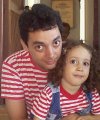This article was published in the Borland
Community web site on October 25, 1999
 Juancarlo
Añez
Juancarlo
AñezThese articles about open-source software appeared every Thursday in Borland Developer News between September 1999 and June 2000.
The lesson of Agincourt
Open source programming underdogs may have more advantages than their critics imagine. But whether they win or lose in the end, it's their story that inspires.
Giving away software is a "strategy of the weak." At least most business analysts consider it so when comparing the strategy against the "embrace and extend" strategies used by powerful software houses like Microsoft.
But let me tell you a story that took place 584 years ago today. A story about the weak and their strategies.
Act I

On October 25, 1415, on Saint Crispin's day, a troop of tired, sick, and hungry men -- the unquestionably weak -- defeated an enemy who not only outnumbered them four-to-one but who fought on their own turf. It was at the Battle of Agincourt, when King Henry V led his troops into one of the greatest victories of military history.
Six thousand English soldiers were marching in retreat. Their destination was the safe port of Calais, from whence they hoped to escape to England. They were intercepted at Agincourt by French Constable Charles d'Albret and a French army 25,000 strong, including armored cavalry and infantry. Annihilation of the English troops was imminent; they had no advantages -- except for the rain. It rained, and rained, and rained, and the battlefield became a quagmire. Mired in mud, the French cavalry were easy prey for the English archers. The heavily armored infantry men slipped and fell. Struggling to rise they were cut down by the hatchets, hooks, and knives of the highly mobile English raiders.
For every Englishman killed, 25 French were slain. Some 500 French noblemen died on the field. The victory paved the way for English domination of most of France until the middle of the century.
Act II
Like the Constable d'Albret at Agincourt, most open source detractors misjudge the present situation.
They misjudge open source programmers, accusing them of amateurism and claiming that their only motivation is peer recognition. Critics also jump to conclusions about where and how these programmers earn their income, and about their knowledge and skills. The critics are in for a surprise.
And like d'Albret, analysts misjudge the battlefield as well. Today's internetworked world is fundamentally different from that on which the current software giants built their empires. And things are changing rapidly. Today, news of friends or foes, features or bugs, span the world in a matter of hours. Things are fundamentally different when anyone can post a question, and receive more than one authoritative answer from people across the globe. Things are fundamentally different when even your teenage son is among the ones posting the answers. Things are fundamentally different when the computer I carry in my waist pack is several times more powerful than the computer I learned to program on. It's raining folks. It's pouring!
Epilogue
Business analysts comment with a sneer that it's easy to double your market share every year when you start from zero. They speculate about what will happen when the software giants feel their territory threatened and decide to charge. They predict victory for the corporations; the apparently strong. But in the fast-changing world of the Internet, the advantage may well go to those who are flexible, agile, free from corporate inertia, and brave enough to take the risks.
The Hundred Years War, of which Agincourt was part, was eventually won by the French, and the English were expelled from French territory. But the legend of the victory at Agincourt lives on.
Likewise, the final outcome of the battles between the open source advocates and traditional business may not be the most important thing. It's the tale of open source and of the souls that fight for it that inspires, and will therefore last.
This story shall the good man teach his son;
And Crispin Crispian shall ne'er go by,
From this day to the ending of the world,
But we in it shall be remembered;
We few, we happy few, we band of hackers;
For he today that shares his code with me
Shall be my brother; be he ne'er so vile,
This day shall gentle his condition:
And programmers of closed source now a-bed
Shall think themselves accurs'd they didn't code,
And hold their skill sets cheap whiles any speaks
That coded with us upon Saint Crispin's day.
By Juancarlo Añez with apologies to William Shakespeare
Originally written for In Publishing LLC
Copyright © 1999 Inprise Corp.
